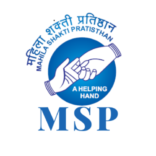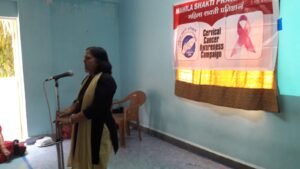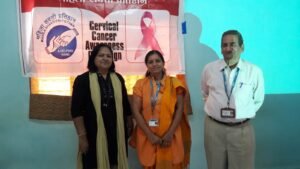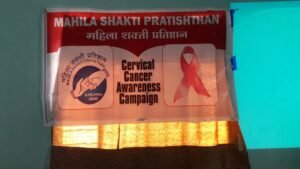Mahila Shakti Pratishthan
Empowering women health through cancer awareness and support programs across India.
Project Details
Project Background
India faces a staggering cancer crisis, particularly among women. Each year, over 1.5 million women are diagnosed with cancer, with breast and cervical cancers accounting for nearly 40% of these cases. Tragically, limited access to information, early screening, and affordable treatment results in thousands of preventable deaths. Women in rural India, in particular, bear the brunt of this burden due to poverty, illiteracy, and scarce healthcare services. They often remain unaware of the symptoms of cancer until it is too late.
Mahila Shakti Pratishthan (MSP), a Pune-based non-profit, is committed to changing this harsh reality. With the support of generous donors, we aim to create a future where women are empowered to detect and treat cancer early. Our project addresses this urgent issue by providing education, free screenings, and support to women affected by cancer, with a special focus on underserved rural communities. Your support can help us save lives by bringing awareness, compassion, and medical resources to the women who need them most.
Project Objectives
- Increase Awareness: Educate women and communities about different types of cancers that affect women, particularly breast, cervical, ovarian, and uterine cancers.
- Promote Early Detection: Emphasize the importance of early screening and detection, which is vital for successful treatment and survival.
- Reduce Stigma: Work to reduce the stigma surrounding cancer, encouraging open discussions and support for women facing cancer diagnoses.
- Facilitate Access to Resources: Provide women with access to cancer screenings, medical consultations, and financial aid for treatment.
- Build a Support Network: Develop a network of healthcare providers, volunteers, and survivors to offer emotional and practical support.
Project Activities
- Awareness Campaigns
- Information Sessions: Host community sessions to inform women about the types of cancer that commonly affect them, risk factors, and prevention strategies. These sessions will be conducted by healthcare professionals and volunteers trained by CPAA.
- Workshops: Conduct workshops on self-examination techniques for breast cancer and provide resources about HPV vaccinations to prevent cervical cancer.
- Digital Outreach: Use social media, newsletters, and informational videos to reach a larger audience, especially young women, with targeted messages on cancer prevention.
- Cancer Screening Camps
- Monthly Screening Events: Organize screening camps in collaboration with local healthcare facilities to provide free or subsidized screenings for breast and cervical cancer.
- Rural Outreach: Set up mobile screening units to reach women in rural areas where healthcare access is limited. These mobile units will be staffed by trained healthcare professionals and equipped with basic screening tools.
- Follow-Up Care: Establish a system to track screened individuals for follow-up appointments and additional tests if abnormalities are detected.
- Counseling and Support Groups
- Emotional Support: Provide one-on-one counseling for women diagnosed with cancer to help them cope with the emotional challenges.
- Support Groups: Form survivor and support groups where women can share their stories, offer encouragement, and learn about available resources. This community support will be instrumental in fostering resilience and a sense of belonging.
- Family Counseling: Educate families of cancer patients on how to provide emotional and practical support during treatment and recovery.
- Financial Assistance Program
- Treatment Subsidies: Identify low-income individuals who require financial support for cancer treatments. MSP, with help from CPAA, will assist these women in applying for grants and subsidies.
- Fundraising Initiatives: Organize fundraising events and secure sponsorships to support women unable to afford cancer treatment. Donations will also go toward providing medical supplies, screening equipment, and counseling resources.
- Training for Volunteers and Healthcare Workers
- Volunteer Training Program: Train volunteers on cancer awareness, prevention, and support strategies to help them serve as community ambassadors for the initiative.
- Medical Staff Training: Collaborate with CPAA to conduct specialized training sessions for healthcare providers in early cancer detection and culturally sensitive patient support.
Project Objectives
Awareness and Education: Educate women, especially in rural areas, on cancer risks, early detection, and preventive health measures.
Screening and Early Detection: Facilitate regular, accessible cancer screenings in rural areas to detect cases early when they are most treatable.
Support Services: Provide emotional, social, and financial assistance to women diagnosed with cancer, offering them the resources and comfort to fight the disease.
Capacity Building of Health Workers: Train local health workers to educate communities about cancer prevention and early detection.
Advocacy for Improved Healthcare Access: Partner with government agencies, hospitals, and other NGOs to advocate for better cancer treatment and healthcare infrastructure for underserved women.
Key Activities
1)Awareness Campaigns
1)Community Workshops and Meetings
2)Host awareness sessions to educate women about cancer risks, symptoms, and the critical importance of early detection.
3)Local Language Educational Materials: Distribute pamphlets, posters, and handouts in local languages, focusing on breast and cervical cancer information.
Media Outreach
Engage local radio, newspapers, and social media to expand the reach of our awareness messages.
Screening Camps
Free Cancer Screening Camps: Organize health camps to provide free mammograms and Pap smears in remote and rural areas.
Mobile Screening Units: Partner with healthcare providers to bring screening equipment to rural communities, ensuring women have access to these vital services.
Training Programs for Health Workers:
Train local health workers and volunteers to raise awareness, teach self-examination techniques, and identify early symptoms in their communities.
Resource Distribution: Equip trained health workers with materials and resources to continue spreading cancer awareness.
Support Services for Women Diagnosed with Cancer:
Financial Assistance for Treatment: Help underprivileged women afford diagnostic tests, medications, and cancer treatments.
Counseling and Peer Support: Provide professional counseling and facilitate peer support groups to help cancer patients and their families cope with the emotional toll of the disease.
Advocacy and Partnerships
Collaboration with Health Departments: Work with local governments, hospitals, and NGOs to improve cancer treatment accessibility.
Policy Advocacy: Lobby for better healthcare policies and insurance coverage for cancer treatment, focusing on rural and low-income women.
Expected Outcomes
Increased Awareness: Thousands of women, especially in rural communities, will gain awareness about cancer risks and the importance of early detection, empowering them to take proactive steps toward their health.
Higher Early Detection Rates: With greater access to screenings, more women will detect cancer early, leading to improved survival rates and better health outcomes.
Enhanced Support for Cancer Patients: Women diagnosed with cancer will receive much-needed financial, emotional, and social support, reducing the isolation and fear associated with the disease.
Sustainable Healthcare Support Network: Trained health workers and volunteers will continue cancer awareness and prevention efforts in their communities, creating a legacy of knowledge and support.
Project Budget
Estimated Total Budget: ₹6,400,000 (INR)
Budget Item | Details | Amount (INR) |
Awareness Campaigns | Educational materials, media, outreach | ₹700,000 |
Screening Camps | Equipment, medical staff, transportation | ₹1,500,000 |
Training for Health Workers | Trainer fees, travel expenses, training materials | ₹500,000 |
Support Services (Financial Aid) | Diagnostic tests, treatment, medication support | ₹2,000,000 |
Counseling and Mental Health | Counselor fees, peer support workshops | ₹400,000 |
Administration and Management | Staff salaries, office expenses | ₹800,000 |
Advocacy and Partnership | Travel and meeting costs for advocacy efforts | ₹300,000 |
Miscellaneous | Contingencies and unforeseen costs | ₹200,000 |
Monitoring and Evaluation
Monthly Progress Reports: Document the number of women reached, screening camps conducted, and awareness sessions held.
Mid-Term Evaluation: Conduct an evaluation after the first year to assess project impact and make necessary adjustments.
Final Evaluation: At the end of the project, evaluate the overall effectiveness in raising cancer awareness and improving early detection rates.
Sustainability Plan
To ensure the project’s long-term impact, MSP will focus on building local capacity by training health workers and volunteers. We will establish partnerships with local hospitals and government departments, enabling continued screenings and support services. Our advocacy efforts will push for healthcare policy changes to make cancer treatment more affordable and accessible in rural areas, ensuring this critical work can continue for years to come.
A Call to Action
Cancer should not be a death sentence for women in India simply because they lack information or resources. Mahila Shakti Pratishthan is determined to change this. But we can’t do it alone.
By contributing to this project, you can help us bring life-saving knowledge, screening, and support to women who would otherwise go without. Together, we can empower women to face cancer with hope, dignity, and strength. Every donation makes a difference, every gift a chance for life.
We invite you to support this initiative and make a tangible impact in the lives of countless women. Join us in this journey to bring health, hope, and healing to women across India.
Thank you.




